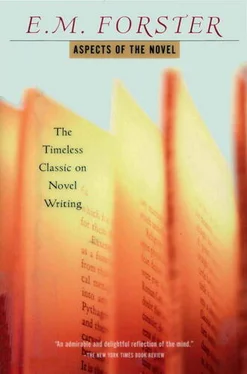I.But as for that mark, I'm not sure about it; I don't believe it was made by a nail after all; it's too big, too round, for that I might get up, but if I got up and looked at it, ten to one I shouldn't be able to say for certain; because once a thing's done, no one ever knows how it happened. O dear me, the mystery of life! The inaccuracy of thought! The ignorance of humanityl To show how very little control of our possessions we have—what an accidental affair this living is after all our civilization-let me just count over a few of the things lost on one lifetime, beginning, for that always seems the most mysterious of losses—what cat would gnaw, what rat would nibble-three pale blue canisters of bookbinding tools? Then there were the birdcages, the iron hoops, die steel skates, the Queen Anne coal-scuttle, the bagatelle-board, the hand-organ—all gone, and jewels too. Opals and emeralds, they lie about the roots of turnips. What a scraping paring affair it is to be surel The wonder is that I've any clothes on my back, that I sit surrounded by solid furniture at this moment. Why, if one wants to compare life to anything one must liken it to being blown through the Tube at fifty miles an hour. . . .
II.Every day for at least ten years together did my father resolve to have it mended; 'tis not mended yet. No family but ours would have borne with it an hour, and what is most astonishing, there was not a subject in the world upon which my father was so eloquent as upon that of door-hinges. And yet, at the same time, he was certainly one of the greatest bubbles to them, I think, that history can produce; his rhetoric and conduct were at perpetual handy-cuffs. Never did the parlour door open but his philosophy or his principles fell a victim to it; three drops of oil with a feather, and a smart stroke of a hammer, had saved his honour for ever.
Inconsistent soul that man is; languishing under wounds which he has the power to heal; his whole life a contradiction to his knowledge; his reason, that precious gift of God to him (instead of pouring in oil), serving but to sharpen his sensibilities, to multiply his pains, and render him more melancholy and uneasy under them! Poor unhappy creature, that he should do so! Are not the necessary causes of misery in this life enough, but he must add voluntary ones to his stock of sorrow? Struggle against evils which cannot be avoided, and submit to others which a tenth part of the trouble they create him would remove from his heart for ever.
By all that is good and virtuous, if there are three drops of oil to be got and a hammer to be found within ten miles of Shandy Hall, the parlour door-hinge shall be mended this reign.
The passage last quoted is, of course, out of Tristram Shandy. The other passage was from Virginia Woolf. She and Sterne are both fantasists. They start with a little object, take a flutter from it, and settle on it again. They combine a humorous appreciation of the muddle of life with a keen sense of its beauty. There is even the same tone in their voices— a rather deliberate bewilderment, an announcement to all and sundry that they do not know where they are going. No doubt their scales of value are not the same. Sterne is a sentimentalist, Virginia Woolf (except perhaps in her latest work, To the Lighthouse) is extremely aloof. Nor are their achievements on the same scale. But their medium is similar, the same odd effects are obtained by it, the parlour door is never mended, the mark on the wall turns out to be a snail, life is such a muddle, oh, dear, the will is so weak, the sensations fidgety—philosophy—God— oh, dear, look at the mark—listen to the door— existence is really too . . . what were we saying?
Does not chronology seem less important now that we have visualized six novelists at their jobs? If the novel develops, is it not likely to develop on different lines from the British Constitution, or even the Women's Movement? I say "even the Women's Movement" because there happened to be a close association between fiction in England and that movement during the nineteenth century—a connection so close that it has misled some critics into thinking it an organic connection. As women bettered their position, the novel, they asserted, became better too. Quite wrong. A mirror does not develop because an historical pageant passes in front of it. It only develops when it gets a fresh coat of quicksilver—in other words, when it acquires new sensitiveness; and the novel's success lies in its own sensitiveness, not in the success of its subject-matter. Empires fall, votes are accorded, but to those people writing in the circular room it is the feel of the pen between their fingers that matters most. They may decide to write a novel upon the French or the Russian Revolution, but memories, associations, passions, rise up and cloud their objectivity, so that at the close, when they reread, someone else seems to have been holding their pen and to have relegated their theme to the background. That "someone else" is their self no doubt, but not the self that is so active in time and lives under George IV or V. All through history writers while writing have felt more or less the same. They have entered a common state which it is convenient to call inspiration, [2] I have touched on this theory of inspiration in a short essay called "Anonymity", Hogarth Press, London.
and having regard to that state, we may say that History develops, Art stands still.
History develops, Art stands still, is a crude motto, indeed it is almost a slogan, and though forced to adopt it we must not do so without admitting it vulgarily. It contains only a partial truth.
It debars us in the first place from considering whether the human mind alters from generation to generation; whether, for instance, Thomas Deloney, who wrote humorously about shops and pubs in the reign of Queen Elizabeth, differs fundamentally from his modern representative—who would be someone of the calibre of Neil Lyons or Pett Ridge. As a matter of fact Deloney did not differ; differed as an individual, but not fundamentally, not because he lived four hundred years ago. Four thousand, fourteen thousand years might give us pause, but four hundred years is nothing in the life of our race, and does not allow room for any measurable change. So our slogan here is no practical hindrance. We can chant it without shame.
It is more serious when we turn to the development of tradition and see what we lose through being debarred from examining that. Apart from schools and influences and fashions, there has been a technique in English fiction, and this does alter from generation to generation. The technique of laughing at characters for instance: to smoke and to rag are not identical; the Elizabethan humorist picks up his victim in a different way from the modern, raises his laugh by other tricks. Or the technique of fantasy: Virginia Woolf, though her aim and general effect both resemble Sterne's, differs from him in execution; she belongs to the same tradition but to a later phase of it. Or the technique of conversation: in my pairs of examples I could not include a couple of dialogues, though I wanted to, for the reason that the use of the "he said" and "she said" varies so much through the centuries that it colours its surroundings, and though the speakers may be similarly conceived they will not seem so in an extract. Well, we cannot examine questions like these, and must admit we are the poorer, though we can abandon the development of subject-matter and the development of the human race without regret. Literary tradition is the borderland lying between literature and history, and the well-equipped critic will spend much time there and enrich his judgment accordingly. We cannot go there because we have not read enough. We must pretend it belongs to history and cut it off accordingly. We must refuse to have anything to do with chronology.
Читать дальше












